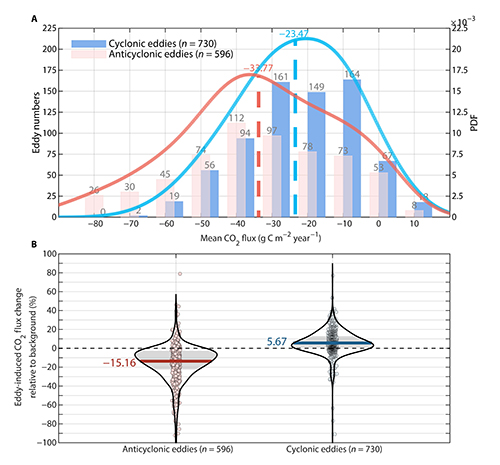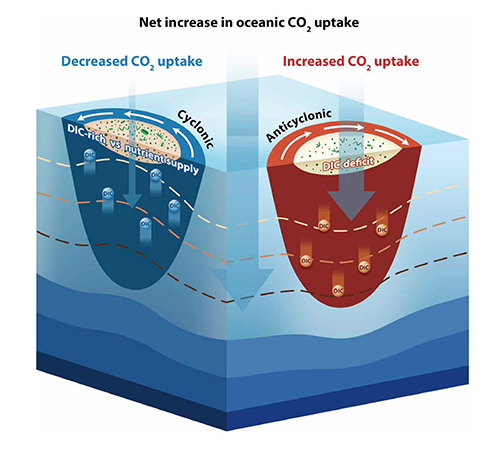On June 11, the research team led by Professor Gan Bolan under the supervision of Academician Wu Lixin at the Frontiers Science Center for Deep Ocean Multispheres and Earth System/Key Laboratory of Physical Oceanography published their latest research titled “Oceanic uptake of CO₂ enhanced by mesoscale eddies” in Science Advances. This study is the first to evaluate the impact of mesoscale eddies on oceanic CO₂ uptake based on large-sample statistics of eddy-induced air-sea CO₂ flux reconstructed by machine learning.
With a focus on key regions of oceanic carbon sinks and eddy activity—the Kuroshio Extension and the Gulf Stream, the research team combined satellite-based eddy tracking with machine learning techniques to reconstruct the sea surface partial pressure of CO₂ (pCO₂) throughout the entire life cycle of over a thousand long-lived eddies. They further systematically analyzed the changes in CO₂ flux, and found that in the Kuroshio Extension (Gulf Stream) region, anticyclonic eddies increased oceanic CO₂ absorption by 15.16% (18.48%), while cyclonic eddies reduced it by 5.67% (5.04%) (Figure 1). Since the enhancement effect of anticyclonic eddies was significantly stronger than the suppression by cyclonic eddies, mesoscale eddies overall increased oceanic CO₂ uptake in the Kuroshio Extension (Gulf Stream) region by approximately 9.98% (13.82%).

The study further revealed that the net increase in oceanic CO₂ absorption is driven by the eddy pumping effect of mesoscale eddies and asymmetric biological responses (Figure 2). Anticyclonic eddies decreased surface dissolved inorganic carbon (DIC) concentrations through eddy pumping, directly promoting CO₂ absorption. Although cyclonic eddies increased surface DIC concentrations through eddy pumping, the associated nutrient input stimulated phytoplankton activity, which consumed some of the DIC and mitigated the suppression of CO₂ uptake by cyclonic eddies.

Current observations and assessments on global ocean carbon sink and mainstream models often fail to adequately represent mesoscale dynamic processes, potentially leading to underestimation of the ocean’s actual CO₂ absorption capacity. This study quantifies the net enhancement effect of mesoscale eddies on oceanic CO₂ uptake and elucidates the coupled physical-biological mechanisms involved, providing a scientific basis and direction for evaluating global ocean carbon sink.








